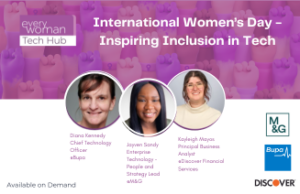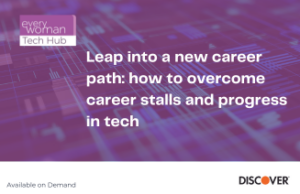After taking on an apprenticeship with Openreach in 2018, Hannah Gorman (née Hargreaves) became an engineer with the company, working on everything from scaling telegraph poles to installing wires. Through blogging about her experiences and scooping up accolades such as the 2020 everywoman in Technology Apprentice Award and 2019 ITP Apprentice of the Year, Hannah has been instrumental in raising the visibility of female engineers.
While Hannah loved her field-based engineering role, she decided to take on the position of customer experience manager — still at Openreach — in 2019, to gain a new skillset. Keen to get back outside however, she moved to her current role as clerk of works in 2020.
Here, she explains how she has managed her progression from apprentice to supervisor in just three years, and gives valuable insight into what she’s learnt along the way.
What do you do in your role on a daily basis?
I look after civil subcontractors, who are the guys that dig up the road on behalf of Openreach. They carry out works like putting in new ducts and clearing blockages in current ducts, to get fibre onto the premises. It’s all part of getting Full Fibre broadband [the fastest and most reliable there is] across the UK. This means I’m out in the field every day, checking and seeing where different civils jobs will be before the work takes place, then on the day being there to help solve any issues. Prior to this role I was customer experience manager – a position that I took on to help with my career progression, which it has. But it was office-based and I didn’t enjoy being inside. I decided to put my mental wellbeing first and take a field-based role again, and it feels great to be back outside. Even in the depths of winter!
What is the biggest misconception people have about your role or job function?
That it’s a man’s job. If I take a male trainee out on a job with me, people will speak to him before they speak to me. But hopefully, the more women we have do field-based roles, the more that perception will change. Openreach is actually doing a massive campaign to hire more women at the moment, such as including more women in adverts. This is fantastic, and definitely the way forward. It’s still a man’s world at the moment, but I’ve seen a change in the three years I’ve been here. I was one of the first female engineers back then, and I put myself out there and told the story from a female perspective — both the successes and the failures! For instance, I failed one of the courses — poles, steps and ladders — just because I thought I couldn’t climb a pole. Everyone followed me on that journey and my story has encouraged a lot of women to apply, which I believe helped me to win various awards.
What are the core skills you use on a daily basis that are essential to your success — and how do you cultivate and expand on those skills?
You need to be strong-willed in this role, plus have good decision-making and risk-assessment skills. There is a big health and safety aspect, as you’re looking at what subcontractors are doing all the time and making sure it’s safe. You also need customer experience skills, which is something I’ve been able to bring from my previous role. I liaise with the public on behalf of Openreach when they’re asking questions like, ‘Why are you digging up in front of my property?’ I’ve grown these skills through having a mentor. For the last seven months, I was shadowing a man called Tony, who’d been with Openreach for 40 years — he actually retired just last week. So I had a person with that kind of experience standing next to me, nurturing my knowledge and sharing everything they could with me. For that I’ll always be grateful. Men are hugely important in helping the women here; without them I wouldn’t be where I am.
What’s the biggest challenge you have in your role presently, and what’s your approach to meeting that challenge?
Learning everything about civils work and all the different rules that apply. I approach it by doing all the reading that I can and just asking all the questions. I draw on the people that have the knowledge, like Tony. I used to ask him questions every day to find out more and more about the role. You never stop learning here. Every day is a school day.
Thinking about your career going forward, how are you actively preparing to continue being successful?
Having mentors is hugely important. There are different schemes available, like the one via the Institute for Telecommunications Professionals (ITP) but I’ve always found my mentors informally. I’ve emailed people, asked questions and they have always just seemed willing to give me their time, which is fantastic. I have one at the moment called Beth Mitchell, who is part of BT. We have calls once a month just to see how I’m doing and what’s next. She gives me advice on who to email and how to reach a certain level without taking an office job. A lot of people think that to be a manager you’ve got to be in an office, and it’s been helpful for me to have that mindset shift. I can get all the skills I need but still stay out in the field, which is much better for my mental wellbeing.
What’s your number one ‘get that job’ tip that’s worked for you?
What’s the worst they can say? When I’ve wanted jobs in the past, I’ve built myself up to speaking to the hiring manager by just thinking, ‘The worst they can come back with is no’. I always believe you should go for it, even if you look at the job description and think it might be out of your depth – you’re never going to push yourself while you’re inside your comfort zone.
What industry trend are you most excited about at the moment?
Building Full Fibre broadband for the whole of the UK is the most amazing thing to be involved in, and the thing that most encouraged me to take this role. It’s something that is going be future-proof — around as long as I’ll be alive, and probably my child too — and the capacity for what it can do is just amazing. It’s great to be part of building something that exciting.



